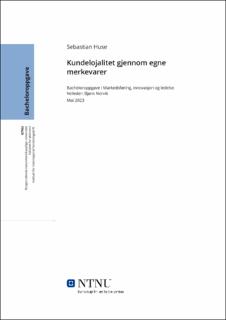Kundelojalitet gjennom egne merkevarer
Bachelor thesis
Permanent lenke
https://hdl.handle.net/11250/3071931Utgivelsesdato
2023Metadata
Vis full innførselSamlinger
Sammendrag
Temaet for oppgaven er rettet mot det norske dagligvaremarkedet og egne merkevarer. For denne bacheloroppgaven skal man forsøke å svare på problemstillingen ‘‘Hvordan kan bruken av egne merkevarer påvirke kundelojalitet?’’. Det er valgt å fokusere på fire forskningsspørsmål for å veilede diskusjonen for oppgaven. Disse forskningsspørsmålene fokuserer på valg av merk i lys av pris og kvalitet, merkepreferanser, kundetilfredshet og merkerelasjoner.
I denne oppgaven er det blitt benyttet en digital spørreundersøkelse som metode for å samle inn data som vil bli brukt for å svare på oppgaven. Undersøkelsen ble gjennomført ved bruk av et anonymt spørreskjema gjennom nettsiden Nettskjema.no. Det var totalt 93 respondenter som svarte på undersøkelsen. Etter å ha samlet inn data ble dataen analysert med dataprogrammet SPSS Statistics. Utfra dataen som ble samlet kunne man se til antydninger for at dataen potensielt stemte overens med forskningsspørsmålene. For å trekke konklusjoner på forskningsspørsmålene ble det vektlagt fokus på validitet, reliabilitet og teori for å drøfte spørsmålene videre.
For å danne et teoretisk grunnlag ble det fokusert på blant annet kjøpsprosessen, holdnings- og atferdsmål, merkevarepyramiden og bruk av forskningsartikler. Kjøpsprosessen ble valgt for å danne et grunnlag for hvordan kunder foretar et kjøp av produkt eller tjeneste, videre med holdnings- og atferdsmål for hvordan man kan måle kundelojalitet, merkevarepyramiden for faktorer som skaper kundelojalitet og forskning som vektlegger hva som påvirker kundelojalitet. The theme for this bachelor thesis is targeted at the Norwegian grocery market and private labels. For this thesis one shall try to answer the following question ‘‘How can the usage of private labels affect customer loyalty?’’. To guide the discussion the paper focuses on four research questions. These research questions are directed at subjects such as price and quality, brand preference, customer satisfaction and brand relations.
In this thesis a digital survey has been used as a method to collect data to help answer the question mentioned earlier. The survey was completed by using an anonymous survey through the website Nettskjema.no. There was a total of 93 respondents which answered the survey. After collecting the data this data was analyzed by using the data program SPSS Statistics. Based on the data that was collected, there was results which could indicate that the research questions were correct. To draw conclusion there was focus on validity, reliability, and theory to guide the questions further for the discussion.
To create a theorical foundation there was focus on the consumer buying process, attitudinal and behavioral measures, the branding pyramid, and the usage of research articles. The consumer buying process was chosen to understand how customers makes a purchase of a product or service, attitudinal and behavioral measures was used for how one could measure customer loyalty, the branding pyramid to see which factors creates customer loyalty and additional research for what affects the customer loyalty.
